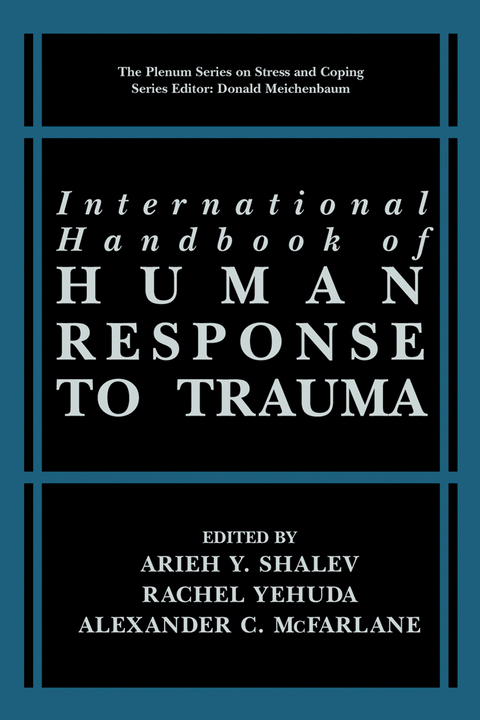
International Handbook of Human Response to Trauma
Kluwer Academic/Plenum Publishers (Verlag)
978-0-306-46095-1 (ISBN)
In 1996, representatives from 27 different countries met in Jerusalem to share ideas about traumatic stress and its impact. For many, this represented the first dialogue that they had ever had with a mental health professional from another country. Many of the attendees had themselves been exposed to either personal trauma or traumatizing stories involving their patients, and represented countries that were embroiled in conflicts with each other. Listening to one another became possible because of the humbling humanity of each participant, and the accuracy and objectivity of the data presented. Understanding human traumatization had thus become a common denomi nator, binding together all attendees. This book tries to capture the spirit of the Jerusalem World Conference on Traumatic Stress, bringing forward the diversities and commonalties of its constructive discourse. In trying to structure the various themes that arose, it was all too obvious that paradigms of different ways of conceiving of traumatic stress should be addressed first. In fact, the very idea that psychological trauma can result in mental health symptoms that should be treated has not yet gained universal acceptability. Even within medicine and mental health, competing approaches about the impact of trauma and the origins of symptoms abound. Part I discusses how the current paradigm of traumatic stress disorder developed within the historical, social, and process contexts. It also grapples with some of the difficulties that are presented by this paradigm from anthropologic, ethical, and scientific perspectives.
I. Human Response to Trauma: An Evolving Paradigm.- 1. The Limiting Effects of Paradigms on the Concept of Traumatic Stress.- 2. On the Social Denial of Trauma and the Problem of Knowing the Past.- 3. Our Hearts and Our Hopes Are Turned to Peace: Origins of the International Society for Traumatic Stress Studies.- 4. An Alternative History of Traumatic Stress.- II. Trauma and Culture.- 5. Cultural Diversity in the Appraisal and Expression of Trauma.- 6. The Discourse on Trauma in Non-Western Cultural Contexts: Contributions of an Ethnographic Method.- 7. Historical and Cultural Construction of PTSD in Israel.- 8. Cultural Identity and Demonization of the Relevant Other: Lessons from the Palestinian-Israeli Conflict.- III. The Victimization of Women and Children.- 9. Children: Secondary Victims of Domestic Violence.- 10. Evaluating the Prevalence and Impact of Domestic Violence.- 11. Collusion and Denial of Childhood Sexual Trauma in Traditional Societies.- 12. Body Image and Body Recovery.- 13. Deliberate Sexual Torture of Women in War: The Case of Bosnia-Herzegovina.- 14. The Controversy Concerning Recovered Memory of Traumatic Events.- IV. Studying The Effects of Trauma Over its Changing Longitudinal Course.- 15. Obstacles to Assessment of PTSD in Longitudinal Research.- 16. Conceptual and Methodological Issues in Trauma History Assessment.- 17. When the Victim Forgets: Trauma-Induced Amnesia and Its Assessment in Holocaust Survivors.- 18. Prospective Studies of the Recently Traumatized.- V. Neurobiology of Human Response to Trauma.- 19. Cortisol Alterations in PTSD.- 20. Brain Imaging Studies of PTSD.- 21. Sleep and the Pathogenesis of PTSD.- 22. The Emerging Neurobiology of Dissociative States: Relevance to PTSD.- VI. Treating the Survivor in the Acute and Chronic Aftermath of an Adverse Event.- 23. Conservation of Resources in Individual and Community Reaction to Traumatic Stress.- 24. Cognitive Behavioral Treatment for PTSD.- 25. Trauma-Focused Psychodynamic Psychotherapy for Individuals with Posttraumatic Stress Symptoms.- 26. Pharmacological Treatment of Trauma-Related Disorders.- 27. Critical Incident Stress Debriefing.- 28. Coping and Community Resources in Children Facing Disaster.- VII. Healing Traumatized Societies and Preventing the Cycle of Violence.- 29. The Truth and Reconciliation Commission in South Africa as an Attempt to Heal a Traumatized Society.- 30. The Role of Mental Health Professionals in Building Bridges of Peace.- 31. The Psychological Cost of Seeking and Granting Asylum.- Afterword Future Perspectives.- Appendix The International Society for Traumatic Stress Studies: Childhood Trauma Remembered.
| Reihe/Serie | Springer Series on Stress and Coping |
|---|---|
| Zusatzinfo | XVI, 477 p. |
| Verlagsort | New York |
| Sprache | englisch |
| Maße | 178 x 254 mm |
| Themenwelt | Geisteswissenschaften ► Psychologie ► Psychoanalyse / Tiefenpsychologie |
| Geisteswissenschaften ► Psychologie ► Traumatherapie | |
| Medizin / Pharmazie ► Medizinische Fachgebiete ► Neurologie | |
| Medizin / Pharmazie ► Medizinische Fachgebiete ► Psychiatrie / Psychotherapie | |
| ISBN-10 | 0-306-46095-5 / 0306460955 |
| ISBN-13 | 978-0-306-46095-1 / 9780306460951 |
| Zustand | Neuware |
| Haben Sie eine Frage zum Produkt? |
aus dem Bereich


